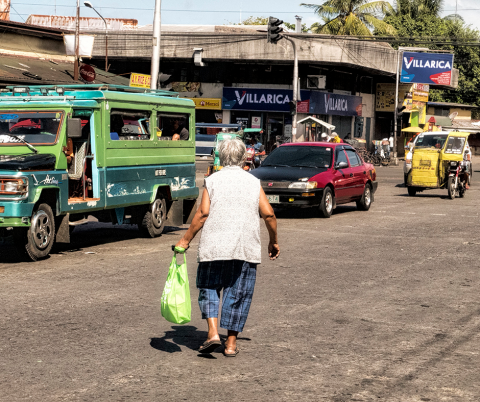Empowering Family Caregiving Research in the Philippines (2024-2025)
Background
Population aging is intensifying and spreading at an unprecedented pace worldwide. The world’s population aged 60 years or above is projected to reach 2.1 billion by 2050, more than doubling from 1 billion in 2020. Discussion on population aging has mainly focused on high-income countries; however, some of the most rapidly aging countries in the world are in Southeast Asia, including the Philippines. The share of the population older than 65 in the Philippines is projected to be over 10% by 2040.
Aging is often associated with declining health and impaired functional abilities. Older Filipinos increasingly depend on caregivers to maintain their basic daily living activities, such as eating, dressing and bathing. Family and close-knit kin remain the primary care providers for older adults’ daily needs. However, little is known about family caregivers' sociodemographic and health characteristics and the health status of care recipients in the Philippines.
The imminent increase in the older population in the Philippines necessitates proactive preparation in key areas, including healthcare, economic and social support, and long-term care. Long-term care facilities provide medical and personal care to older adults who cannot live independently and are still developing in the Philippines. It remains unclear how the demand for long-term care will evolve and whether sufficient financing and workforce will meet that demand.
Project Description
This project team will work with local academic and government partners to advance the understanding of preparedness for the upcoming population aging in the Philippines at the individual-, family- and society-levels. Team members will conduct a comprehensive scoping review of long-term care policies and programs in the Philippines as well as a qualitative study involving key informant interviews with older adults, their caregivers and national-level policymakers to explore their attitudes and readiness for the challenges of population aging and the increased demand for long-term care. Team members will also engage policymakers to finalize the study plan and discuss results and policy implications.
Team members will characterize family caregivers’ sociodemographic and health profiles, the amount and type of their caregiving tasks, care recipients’ health and functional status and how their health status influences the caregiving experience and burden among caregivers. The team will use data from the 2018 Longitudinal Study of Aging and Health in the Philippines (LSAHP). The LSAHP comprises a nationally representative sample of 5,985 older Filipinos and is designed to depict their health status and well-being.
The team will project the trend in long-term care costs for home-based caregiving services in the Philippines over the next 30 years. Team members will measure direct and indirect costs of long-term care and use the forecasted age- and sex-specific population size and death probabilities of older adults from 2020 to 2050 of the United Nations Department of Economic and Social Affairs.
Anticipated Outputs
Dissemination materials for policymakers; peer-reviewed manuscript; data for future proposals
Student Opportunities
Ideally, this project team will include 3 graduate students and 4 undergraduate students with interests in global health, public policy, sociology and economics. Students with prior experience in data management, qualitative data analysis, modeling, interviews, literature review and/or communication are preferred.
Please note that this is a joint Duke-DKU team that will include faculty and students from both institutions. Applicants should be excited to work collaboratively across institutions and should expect to coordinate meetings across time zones.
In Fall 2024, the team will meet on Mondays from 8-9 p.m. EST (Tuesdays from 8-9 a.m., Beijing time). During weekly meetings, students will participate in exercises to obtain skills and knowledge in health care teamwork, including understanding the ethics and values of team members, clarifying roles and responsibilities of team members, communication within the team and processes to support successful teamwork. Team members will gain experience in fieldwork, literature review, data collection and analysis, and scientific writing. Each student will receive a tailored mentoring plan that includes didactic training and mentored research.
In an optional summer component in Summer 2025, select students will travel to Manila, Philippines to conduct fieldwork.
Timing
Fall 2024 – Summer 2025
- Fall 2024: Seek IRB approval; conduct literature review; learn management and quantitative data analysis skills; contact local partners; set up field sites
- Spring 2025: Manage, analyze, present and interpret quantitative data; write manuscript
- Summer 2025 (optional): Travel to Philippine study sites; interview stakeholders; analyze qualitative data; prepare dissemination initiatives
Crediting
Academic credit available for fall and spring semesters; summer funding available
This Team in the News
Assistant Professor Awarded two Bass Connections Projects
Image: Crossing: Elderly lady making her way across the road, Bacolod City, Philippines, by Brian Evans, licensed under CC BY-ND 2.0

Team Leaders
- Chenkai Wu, Duke Kunshan University
- Hanzhang Xu, School of Medicine-Family Medicine and Community Health
- Xiaochen Zhang, Duke Kunshan University
/yfaculty/staff Team Members
-
Yichen Xu, Duke Kunshan University
